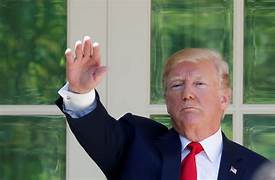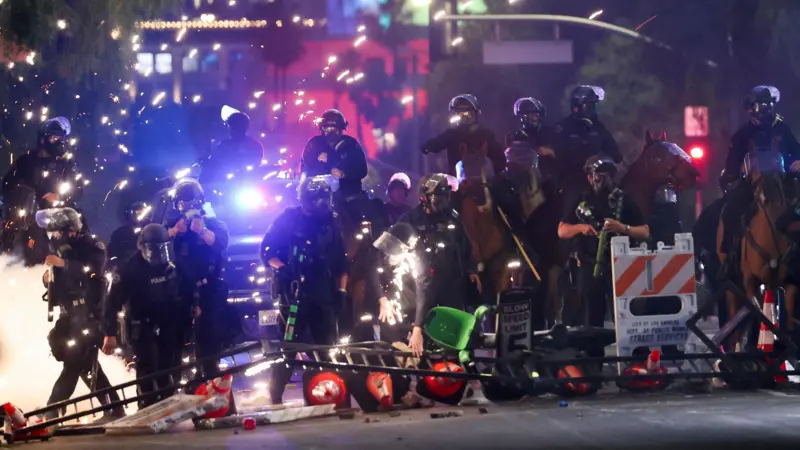Schmittian Moments 1


'Trump’s actions in Los Angeles are not merely heavy-handed or unconstitutional, they are the logical conclusion of a Schmittian theory of sovereignty in which executive power stands above law, dissent is rebellion, and violence becomes the medium through which political order is restored. His governance style blends theological imagery, militarised domestic policy, and an existential friend–enemy framing to justify unprecedented coercion.This is not just about immigration or protests. It is about the redefinition of democracy into a form of plebiscitary authoritarianism, where law exists to serve the sovereign, and the sovereign speaks in the voice of the nation. It is a clear instance of proto-fascist governance rooted in Schmittian logic, and aligned, structurally and ideologically, with the practices of authoritarian leaders across the globe.'
The events of 8 June 2025, in which President Trump unilaterally deployed 2,000 National Guard troops to Los Angeles to suppress protests over ICE raids, can be understood best through the conceptual lens of Carl Schmitt, whose theories on sovereignty, law, political theology, and the friend–enemy distinction cast light on the authoritarian logic at play. This intervention is not merely a political manoeuvre; it reflects a broader quasi-fascist governance style rooted in Schmittian assumptions, aligning Trump with contemporary authoritarian figures like Narendra Modi in India and invoking echoes of historical fascist practices.
Schmittian Sovereignty: "He Who Decides on the Exception"
At the core of Schmitt’s political theory is the claim: "Sovereign is he who decides on the exception." Trump’s decision to override Governor Newsom’s authority and federalize the California National Guard exemplifies this sovereign prerogative. By invoking 10 U.S.C. §12406 - claiming a rebellion is underway - Trump places himself outside the normal constitutional order, exercising a sovereign decision that redefines the legal and political terrain. He transforms protest into insurrection, a category that legitimizes the suspension of ordinary law and democratic checks. This is a clear case of the exception becoming the norm, a condition Schmitt identifies as the precondition for authoritarian legality.In Schmitt’s terms, law becomes a tool not of procedural justice but of executive discretion. Trump’s deployment of the National Guard without gubernatorial request recalls the state of exception that legal theorists like Giorgio Agamben argue is the dominant paradigm of governance in late modernity, where power is legitimated not through rule-bound procedures, but through the leader’s claim to defend the state’s existential integrity. In this paradigm, the president does not follow the law; he becomes the law.
Political Theology and the Return of the Theocratic Executive
Schmitt’s concept of political theology asserts that modern politics is essentially a secularised form of theological decisionism. Trump’s rhetoric, policies, and performative interventions frequently adopt a quasi-messianic tone, positioning him as a redeemer of the nation, besieged by outsiders (immigrants) and traitors (liberal elites, sanctuary cities). The invocation of "very strong law and order" and the deployment of troops mirror the theological structure of divine punishment and purification, in which violence is sanctified in the name of national renewal. The nationalist project of purification, removing immigrants, particularly from Latin America, with military assistance, is not merely pragmatic; it draws on a political theology of the chosen people and the sacred land, where the presence of undocumented migrants is cast as a desecration. Just as Schmitt saw Catholicism as shaping absolutist political forms, Trumpism reconfigures evangelical and nativist theology into a politics of executive salvation, casting migrants as demonic and the state as angelic when wielded by a strong, divinely inspired leader.
Friend-Enemy Distinction: The War on the Internal Other
Schmitt’s most infamous claim is that the political is defined by the distinction between friend and enemy. Trump’s construction of immigrants, protesters, and liberal state officials as existential threats to the nation is a paradigmatic instance of this logic. The peaceful protest is interpreted not as a democratic right but as rebellion; the undocumented migrant is not a legal issue but a foreign invader; Governor Newsom is not a co-sovereign but an obstructive figure to be overridden.This militarisation of domestic politics - the redefinition of protest as war - enacts Schmitt’s friend/enemy logic by establishing zones of internal enmity. Entire cities like Los Angeles are reframed as rogue territories, and state officials are painted as collaborators with the enemy. This prepares the public for the use of exceptional violence not only against migrants but against any who defend them.
Law as Instrument of Political Will: The Schmittian Legal Order
Trump’s manipulation of rarely used legal provisions, and his thinly veiled threats to invoke the Insurrection Act, reflect Schmitt’s notion of the law as a contingent instrument of political power. Rather than seeing law as a fixed norm that constrains power, the Trump administration treats it as a technical device to authorise sovereign will.ICE’s raids, the use of military aircraft to deport migrants, and the use of Guantanamo Bay and foreign mega-prisons for detentions are all forms of legal exceptionalism that mirror Schmitt’s concern with legality that masks sovereignty. Deporting individuals to countries they are not from, including legal residents, constitutes legal violence in Schmittian fashion: arbitrary, selective, and justified solely by executive necessity.That some migrants have been rendered stateless and treated as objects of logistical transfer - deported, detained, and denied legal recourse - demonstrates how the state of exception becomes the normative condition for certain populations. These are homo sacer figures—lives that can be killed but not sacrificed, excluded from legal protection.
Trump’s actions in Los Angeles are not merely heavy-handed or unconstitutional, they are the logical conclusion of a Schmittian theory of sovereignty in which executive power stands above law, dissent is rebellion, and violence becomes the medium through which political order is restored. His governance style blends theological imagery, militarised domestic policy, and an existential friend-enemy framing to justify unprecedented coercion.This is not just about immigration or protests. It is about the redefinition of democracy into a form of plebiscitary authoritarianism, where law exists to serve the sovereign, and the sovereign speaks in the voice of the nation. It is a clear instance of proto-fascist governance rooted in Schmittian logic, and aligned, structurally and ideologically, with the practices of authoritarian leaders across the globe.